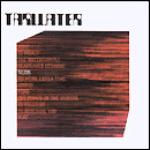 |
 |
|
|
|
| |||
 Tarwater
TarwaterSilur [Kitty-Yo/Mute] Rating: 6.7 Receding roughly 440 million years lands us somewhere near the advent of the Silurian age. An enormous land mass called Gondwanaland stretched from the Carribean to present- day Japan; the Americas had barely emerged in any recognizable form from the great Tethys Sea; Siberia was an island not far from the top of the world. Vertebrate life began to populate the seas. The first flora made the transition from water to land. The reference to this age-- the infancy of the world-- in the title of Tarwater's latest release is no accident. While the German duo doesn't go to the great lengths that Miles Davis went to on Pangea to actually approximate the sound of continental drift and collision, Tarwater's Silur is clearly interested in images of water and earth; the motifs of slow movement and evolution abound. While Silur doesn't exhibit the degree of thematic cohesion that would brand it a concept album, these themes do afford the patient listener a unique kind of access. Founded in 1995, Tarwater is the German post- rock duo of Bernd Jestram and Ronald Lippock. Lippock is also a member of the righteous German squirm collective To Rococo Rot. And while it's not difficult to see the cross- references between these two groups, Tarwater is often worlds away from the clean infectious groove- manipulations of To Rococo Rot, generally opting for a sloppier, more organic brand of electronic sludge. But this is unfortunately not always the case, and occasionally on Silur (most notably on the final track "V-At"), Tarwater reverts to the worn platitudes of German post-rock. The primeval opener, "Visit," sets the tone for the entire album, marked by slow crackly funereal beats, vague droning orchestral samples, and spoken- word lyrics contributed by T-Rex's Marc Bolan. This song is reminscent of much of the music on Labradford's brilliant self- titled debut, particularly in its sonic and lyrical attentiveness to the landscape it purports to move through. "To Moauf" seems to subvert the squirm of To Rococo Rot by layering their trademark twittering electronics over distant bongos and eerie drones, thereby giving the whole affair a much more windblown and ghostly aura. "The Watersample" is probably the centerpiece of Silur, a spoken- word meditation on beach detritus (c.f. T.S. Eliot's "The Dry Salvages" for a more thorough take on ocean litter), set to crackly flutes, piano, vibes, guitar and vocal samples. The repetitive but oddly alluring "Seafrance CÚzanne" returns to the plate- techtonics groove of the opening track. The title cut is merely an American girl reciting a brief narrative about nightswimming to the faintest buzz of electronic noise. But it's unfortunately succeeded by the sucky German trip-hop of "No More Extra Time" which breaks the potent sea- spell of the first five tunes. The sparse acoustic guitar and noise duo of "Otomo" briefly returns us to land's end, but the dropoff occurs. Sadly, the album becomes an erratic mix of push- button electronica and ill- fated clubland sing- alongs. The brief "To Describe You" recaptures the siren song of the disc's first half but its gentle work is regrettably undone by the closing piece, "V-At"-- a minor synth- pop cut- up to roll over the closing credits, I suppose. T.S. Eliot reminds us that "we cannot think of a time that is oceanless/ or an ocean that is not littered with wastage." I guess even in the watery Eden of the Silurian age, a little garbage must fall.
|
|||

